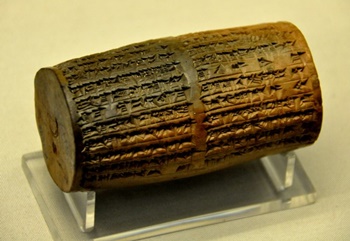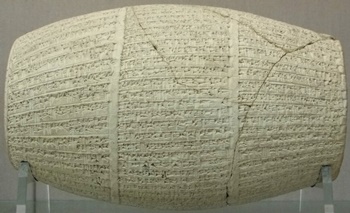Print Article
Author's Bias | Interpretation: conservative | Inclination: promise | Seminary: none
The Cylinders of Nabonidus refer to cuneiform text inscribed on 5 cylinders that are classified as foundation
texts, because they were found in the foundation of buildings of a temple complex. The main purpose of these
foundation cylinders was to record Nabonidus' work of repairing and rebuilding the temple complexes during his
reign (556-539 B.C.).

The foundation cylinder from Ur is only 4 inches
in height and 2 inches in diameter!
© Osama Shukir Mohammed Amin

The foundation cylinder from Sippar is 9 inches in
height and 3.6 inches at its widest diameter.
British official and archaeologist J.G. Taylor excavated a ziggurat at Ur called E-lugal-galga-sisa
(of the temple of Sin complex) and found four identical cuneiform cylinders in 1854.
In a seeming contradiction to the biblical record, ancient Babylonian king lists appear to
indicate that Nabonidus was its last king; the name Belshazzar is absent. The book of Daniel indicates that
Belshazzar was Babylon's last king (Dan 5:1-30).
These cylinders from Ur are significant, because they mention Nabonidus' son Belshazzar, and
subsequent findings proved that Belshazzar was indeed the last king of Babylon.
"As for me, Nabonidus, king of Babylon, save me from sinning against your great godhead
and grant me as a present a life long of days, and as for Belshazzar, the eldest son - my offspring - instill
reverence for your great godhead in his heart and may he not commit any cultic mistake, may he be sated with a
life of plenitude."
Assyriologist H. Rassam excavated a royal palace at Sippar, Babylon (part of the temple of the
sun complex) and found a cuneiform cylinder in 1881.
This cylinder from Sippar is significant for its contribution to understanding Cyrus the Great
and presents him as an instrument of the will of the gods:
"Reverently, I spoke to the Enlil of the gods, Marduk: 'That temple which you ordered me
to build, the Mede surrounds it and his might is excessive.'
But Marduk spoke with me: 'The Mede whom you mentioned, he, his country and the kings who
march at his side will be no more.'
At the beginning of the third year, they aroused him, Cyrus, the king of Anšan, his second
in rank. He scattered the vast Median hordes with his small army. He captured Astyages, the king of Medes, and took
him to his country as captive. Such was the word of the great lord Markuk and of Sin, the luminary of heaven and
the netherworld, whose command is not revoked. I feared their august command, I became troubled, I was worried and
my face showed signs of anxiety. I was not neglectful, nor remiss, nor careless."
Roughly some 175 years earlier, Isaiah prophesized about a man named Cyrus who would play a
significant role in God's plan for His people
(Isa 44:28-45:4)
and make indirect references of him as the means to punish Nebuchadnezzar's Babylon for its sins
(Isa 13:17; 43:14).
"It is I who says of Cyrus, 'He is My shepherd!
And he will perform all My desire.'
And he declares of Jerusalem, 'She will be built,'
And of the temple, 'Your foundation will be laid.'"
(Isa 44:28)
Thus says the Lord to Cyrus His anointed,
Whom I have taken by the right hand,
To subdue nations before him
And to loose the loins of kings;
To open doors before him so that gates
will not be shut:
"I will go before you and make the rough places smooth;
I will shatter the doors of
bronze and cut through their iron bars.
I will give you the treasures of darkness
And hidden wealth of
secret places,
So that you may know that it is I,
The Lord, the God of Israel, who calls you by your
name.
For the sake of Jacob My servant,
And Israel My chosen one,
I have also called you by your
name;
I have given you a title of honor
Though you have not known Me."
(Isa 45:1-4)
Jeremiah, who prophesized from the reign of Josiah until the Exile of Jerusalemites (approx.
627-582 B.C.), was a contemporary of Daniel. Like Isaiah and before the fall of Jerusalem, Jeremiah would
prophesize against Babylon for their sins against Israel
(Jer 50:1-51:64),
and specifically says, the "Lord has aroused the spirit of the kings of the Medes, because His purpose is
against Babylon to destroy it; for it is the vengeance of the Lord, vengeance for His temple."
(Jer 51:11, 28).
Cyrus the Great was the only Gentile that God would address as "His anointed" (Isa 45:1).
References:
1. Law GR, Identification of Darius the Mede, Pfafftown: Ready Scribe Press (2010).
Copyright ©
2018
Helpmewithbiblestudy.org. All rights to this material are reserved. We encourage you to print the material for personal and
non-profit use or link to this site. If you find this article to be a blessing, please share the link so that it may rise in
search engine rankings.